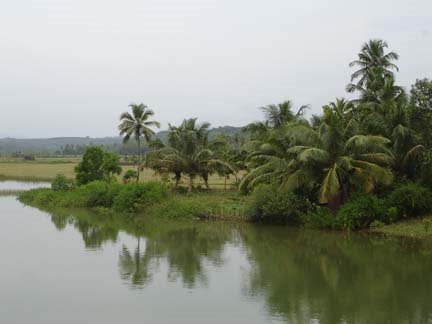Udupi, the renowned temple town is known as ‘Odipu’ in Tulu.The present Udupi has been a shifted town probably during the lifetime of sage Madhvacharya. Originally it was located at a place nearer to the coast known as ‘Adiudupi’ (ādi=original) now.
We have discussed about the origin of the place name of Odipu along with that of Vadabhandeswara, Malpe and Udyavara in post No.184 (The Magic of Malpe). In that the association of the word ‘Mala’(hill) with place name ‘Malappe’(now called‘Malpe’) as well as the association of the ancient word ‘Odi’ with ‘Odipu’, ‘Odibande’ (later known as ‘Vadabhandeswara’) and ‘Odiara’(subsequently known as ‘Udyavara’) have been discussed.The word ‘Odi’ basically represented a magical natural phenomenon from the viewpoint of the early man.
Subsidence
Geolological evidences in the area between the St Mary group of islands and the Malpe-Vadabhandeswara-Adiudupi-Udyavara coast suggest that a slice of land mass originally located between St Mary islands and present beach-line actually broke down, sank and was submerged into the Arabian Sea.This act of breaking down and sinking of a land is described as faulting and subsidence in geological parlance.The word ‘Odi’ employed by the early man in his parlance conveyed the effect of the said geological phenomenon.The word ‘oDipuni’ or ‘uDepuni’ means to break or breech in Tulu and other Dravidian languages even today.
Udappu
There are further collateral evidences on the existence of this word suggestive of natural phenomenon of breaching in other parts of southern India and Srilanka.For example, www.TamilNet.com describes the origin of the name of a similar sounding place- name ‘Udappu’ or ‘Udaipu’ in coastal Srilanka. The village Udappu (Udaippu),in Srilanka is located at the point of 'the breach'. It was a natural breach, later made permanent by the Dutch Canal, linking the waters of the Indian Ocean and the Munthal Lake.
Tamilnet describes the Tamil word ‘Udappu’ as follows:
” A breach, the bursting of a bank, a channel cut or broken through a dam in a field (Tamil, Winslow's dictionary, Dravidian Etymological Dictionary 946); Udappu: The colloquial Tamil form of Udaippu; Odappu: Breach or bursting of a ridge in a rice field or bund (Malayalam, DED 946); from verb roots Odi and Udai: To break (Tamil, DED 946); Udappuwa, Udapuwa: The recently Sinhalicized form of the place name Udappu that doesn't have any meaning in the Sinhala dictionaries.”
-Vishwanath and Ravi
®
Saturday, June 6, 2009
Subscribe to:
Post Comments (Atom)
Blog Archive
Books for Reference
- A Comparative Study of Tulu Dialects By Dr. Padmanabha Kekunnaya. Govinda Pai Reserach Centre, UDupi. 1994
- Koti Chennaya: Janapadiya Adhyayana. By Dr. Vamana Nandavar. Hemanshu Prakashana ,Mangalore.2001.
- Male kudiyaru. Dr B. A.Viveka Rai and D.Yadupathi Gowda, Mangalore University,1996.
- Mogaveera Samskriti By Venkataraja Punimchattaya. Karnataka Sahitya Academy.1993.
- Mugeraru:Jananga Janapada Adhyayana. By Dr Abhaya Kumar Kaukradi.Kannada & Culture Directorate,Bangalore & Karnataka Tulu Academy, Mangalore,1997.
- Puttubalakeya Pad-danagalu. Ed: Dr B.A.Viveka Rai,Yadupati Gowda and Rajashri, Sri Dharmasthala Manjunatheswara Tulu Peeta. Mangalore University.2004
- Se'erige. Ed:Dr K.Chinnapa Gowda.Madipu Prakashana,Mangalagangotri,2000.
- Studies in Tuluva History and Culture.by Dr P Gururaja Bhat (1975).Milagres College,Kallinapur,Udupi.
- Taulava Sanskriti by Dr.B.A.Viveka Rai, Sahyadri Prakashana,Mysore 1977
- TuLu naaDu-nuDi By Dr.PalthaDi Ramakrishna Achar, Puttur.
- TuLu NighanTu. (Editor in Chief: Dr U.P.Upadhyaya, Govinda Pai Research Centre,Udupi. Six volumes. 1988 to 1997
- Tulu Patero-A Philology & Grammar of Tulu Language by Budhananda Shivalli.2004.Mandira Prakashana Mangalore. p.317. (The book is in Tulu Language using Kannada script)
- TuLunadina ShasanagaLa Sanskritika Adhyayana. By Shaila T. Verma (2002) Jnanodaya Prakashana,Bangalore, p.304.(Kannada)
- Tuluvala Baliyendre. Compiled by N.A.Sheenappa Hegde,Polali,Sri Devi Prakashana,Parkala,1929/1999
* Landscape images *
A Coastal estuary

Holegadde near Honavar,Uttara Kannada dist, Karnataka
Copy? Right - but kindly remember to acknowledge!
" tulu-research.blogspot." ತುಳು ರಿಸರ್ಚ್. ಬ್ಲಾಗ್ಸ್ಪಾಟ್. ಇನ್

Have a nice day !

No comments:
Post a Comment